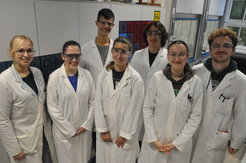Teenagers experience extraordinary holidays
Local school students visit the institute for a whole week
For several years now, there has been a well-established cooperation between the Luisenschule in Mülheim and the Max Planck Institut für Kohlenforschung. During the fall break, some students visited the research facility.

Why is it interesting for chemists to attach so-called "markers" to molecules? What is meant by "late stage" functionalization? Nils Tiryaki, Jennifer Oberdieck, Hannah Schlicht and Tom Ritsch, pupils from the Luisenschule in Mülheim are spending their fall break at a rather unusual place: the apprentice laboratory of the Max Planck Institut für Kohlenforschung.
"We all took part in a special chemistry project, and were told by our teacher about the possibility of coming to the MPI," says Tom Ritsch. The Luisenschule and the MPI have had an established cooperation with the aim to give young women and men an understanding of working in a scientific institution - under real-life conditions.
"We can do things here that are not possible at school," says Nils Tiryaki. The pupils synthesize products that are needed by the chemists at the Institute for their experiments. To make sure everything works out, the teenagers are supervised by Pia Münstermann, Mike Rippegarten and Ilayda Sapancilar. Ilayda is currently doing her apprenticeship as a chemistry technician at the institute.
Speaking of apprenticeships: Would this be an option for the school students? After all, they will be graduating from high school next year. "I want to become a teacher, but it's very exciting to see what happens in an institute like this," says Jennifer Oberdieck. Hannah Schlicht agrees: "I've always been very interested in science, and an internship like this is definitely much better than just hanging around at home during your fall break!"












